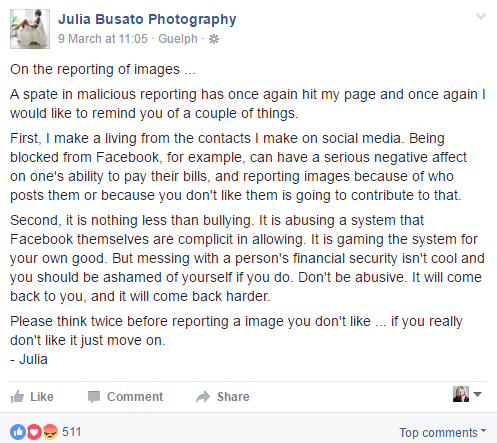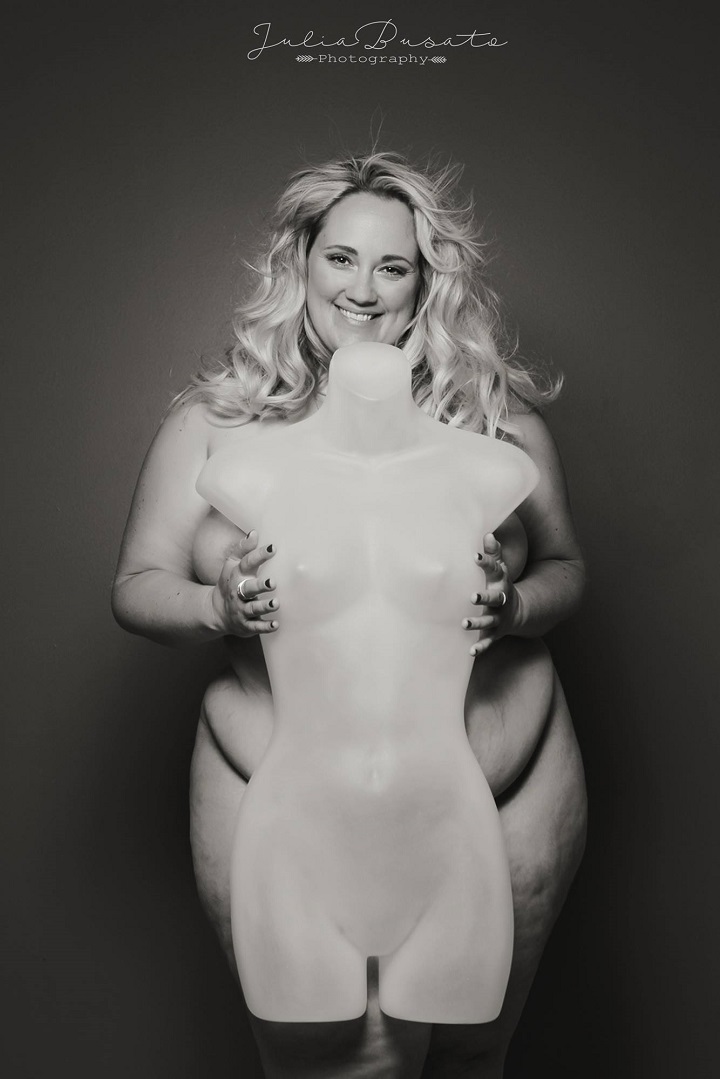Photographer Julia Busato is feeling defiant, despite losing control over one of the main arteries of her business.

The Guelph, Ont., photographer has been banned from Facebook for 30 days, after several photographs from her so-called mannequin series were flagged as inappropriate to the social media site.
The series – which goes by the tag line “Showcasing women who don’t want to fit the mold” – features women of all shapes, sizes and backgrounds posing nude, celebrating their body’s true form.
“It’s about being positive about being a woman and everything life throws at us,” Busato said of the project.
READ MORE: Facebook clarifies stance on post-mastectomy photos
The project started a year ago after Busato, who specializes in boudoir photography, received a mannequin as a gift for her studio. She wanted to incorporate the mannequin into her shoots after realizing most of her clients don’t fit the image projected by the plastic model.
But two days ago Busato’s account was hit with a surge of what she describes as “malicious reporting” – users flagging her pictures as inappropriate to Facebook, resulting in some of the photos being removed, prompting the 30 day ban from the site.
Under the ban she can log in and read comments, but she’s unable to post or respond to any users.

“I make a living from the contacts I make on social media. Being blocked from Facebook, for example, can have a serious negative effect on one’s ability to pay their bills, and reporting images because of who posts them or because you don’t like them is going to contribute to that,” she wrote in a Facebook post earlier this month.

Get daily National news
“Second, it is nothing less than bullying.”
According to Facebook’s Community Standards, the social media site removes images of “people displaying genitals or focusing in on fully exposed buttocks,” as well as “some images of female breasts if they include the nipple.”
LISTEN: Julia Busato speaks with 900CHML’s Scott Thompson about her photo series and being banned from Facebook
Though some of Busato’s images do show exposed female body parts, they are digitally blurred to hide anything intimate.
“I think it’s bad insight on Facebook — they should rethink their standards,” she said, noting she has not contacted Facebook in regards to her account because the company was unco-operative last time she was banned due to the same issue.
“Something that’s showing real life and real women is not offensive and should not be removed.”
This is not the first time the social network has been accused of removing images many feel celebrate body positivity and awareness about issues like breast cancer. For example, in 2013, Facebook re-worded its nudity policy to clarify that post-mastectomy pictures were allowed on the platform thanks to a petition alleging it removed multiple photos from a group called the SCAR Project, which posted portraits of young women and men healing from mastectomies.
READ MORE: Toronto mother’s Instagram account allegedly disabled over breastfeeding photo
Facebook-owned photo sharing app Instagram has also faced controversy for removing pictures of breastfeeding mothers, despite both social networks saying they allow breastfeeding images in their terms of service.
‘I don’t want to defend who I am’
But the malicious reporting of Busato’s photos also comes after an onslaught of negative comments from online trolls, some of which bodyshamed the plus-sized women in the photos.
Adina Ingram, one of the models who posed for the mannequin project, said the odd negative comment wouldn’t bother her, but admitted the last 48 hours have tested her.
“I’m a pretty big advocate of body positivity and I support a lot of plus-size women in their fitness journey, based on my own experience. Because I’m not fresh at this I have grown a little bit of a thick skin – but there is one particular poster that is commenting on all of the bigger women and saying very explicit things,” she told Global News.
“Some people say, go get a gym membership, eat a salad. But I don’t want to defend who I am – that goes against the message of these pictures.”
Busato’s Facebook page has been inundated with comments since she was banned; an overwhelming number of which praised both the photographer and the models for sharing an empowering message. For Ingram, she believes the controversy has opened new doors to share her message of self-love.
“I felt like I had a platform before, but this just makes it more real,” she said, noting women from around the world have reached out to thank her. “In a time where we’re so reliant on technology and social media, I think something like this has made me feel more connected to people than I have been in a long time.”
As for Busato, she refuses to stop posting the images once she regains control of her Facebook account.
“Hell no,” she said, reminding women everywhere to “stay beautiful.”











Comments
Want to discuss? Please read our Commenting Policy first.